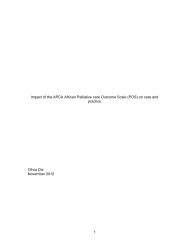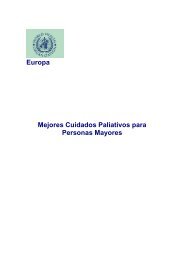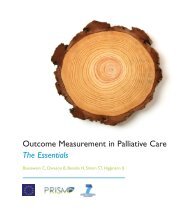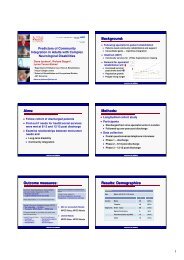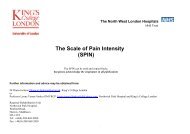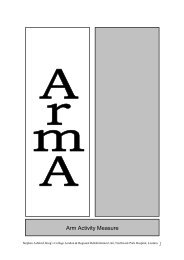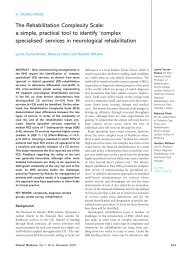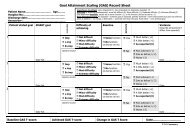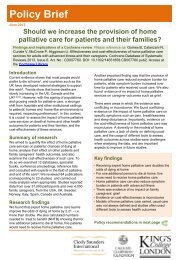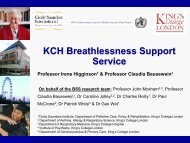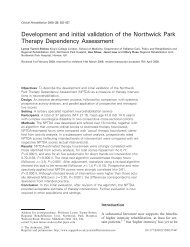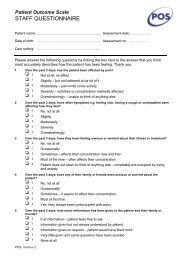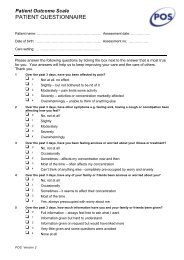2004 - 2007 - Cicely Saunders Institute - King's College London
2004 - 2007 - Cicely Saunders Institute - King's College London
2004 - 2007 - Cicely Saunders Institute - King's College London
Create successful ePaper yourself
Turn your PDF publications into a flip-book with our unique Google optimized e-Paper software.
In focus 3.1 –<br />
Cochrane Reviews<br />
The Cochrane library was set up in the 1980s to provide<br />
a database of randomised controlled clinical trial<br />
evidence which is regularly reviewed and updated.<br />
Whilst RCTs may not always be possible, or even<br />
appropriate, to answer all the questions that need to be<br />
answered, Cochrane reviews form an important contribution<br />
of the literature.<br />
In rehabilitation, the major part of our Cochrane<br />
programme has been undertaken in collaboration with<br />
colleagues in Melbourne, Australia – Dr Fary Khan and<br />
Professor Peter Disler, who is an honorary Visiting<br />
Professor within our department. During this three-year<br />
period we have completed four Cochrane systematic<br />
reviews:<br />
• Exercise for peripheral neuropathy 35<br />
• Multi-disciplinary rehabilitation for acquired brain<br />
injury in adults of working age 165 .<br />
• Multidisciplinary rehabilitation for adults with<br />
multiple sclerosis 327 .<br />
• Rehabilitation interventions for footdrop in<br />
neuromuscular disease 336 .<br />
The two reviews of multidisciplinary rehabilitation for<br />
Acquired Brain Injury (ABI) and for MS were large<br />
systematic reviews incorporating 14 and eight trials<br />
respectively. Pooling of data for meta-analysis was<br />
prohibited by heterogeneity in the trial methods, but<br />
both reviews used a novel ‘synthesis of best evidence’ to<br />
assimilate the trial findings.<br />
• The ABI review provided strong evidence that patients<br />
with moderate to severe brain injuries recover faster<br />
with more intensive rehabilitation programmes, and<br />
that continued out-patient rehabilitation can help to<br />
maintain these gains.<br />
• The MS review also showed strong evidence that<br />
patients with MS can benefit from an inpatient<br />
programme, and can function better, even though<br />
their underlying impairments do not change. Also that<br />
out-patient and community-based programmes can<br />
improve quality of life.<br />
Cochrane reviews are also underway to assess:<br />
• The effectiveness of non-pharmacological interventions<br />
in the management of breathlessness.<br />
• The effectiveness of antidepressants in the<br />
management of depression in physical illness<br />
(Hotopf et al).<br />
4<br />
Clinical Services<br />
There are well established clinical palliative care services<br />
at both King’s <strong>College</strong> Hospital NHS Trust (KCH, one<br />
hospital palliative care team) and at the Guy’s Foundation<br />
and St Thomas’ NHS Foundation Trust (GST, two hospital<br />
palliative care teams and two community palliative care<br />
teams). The services provide a seven day a week visiting<br />
service and consultant-delivered integrated 24-hour<br />
telephone advice across both Trusts and the University<br />
Hospital Lewisham.<br />
Two of the clinical consultants have honorary academic<br />
contracts with the Department of Palliative Care, Policy and<br />
Rehabilitation – Dr Polly Edmonds (lead clinician at KCH)<br />
and Dr Rachel Burman (KCH) and of course Professor<br />
Higginson is a consultant (honorary), primarily for KCH, but<br />
in on call integrated across all units. There are joint monthly<br />
clinical update meetings between the KCH palliative care<br />
team and academics from the Department of Palliative<br />
Care, Policy and Rehabilitation, in order to share key<br />
clinical issues, especially where they relate to policy and to<br />
update on research projects, and a joint journal club. The<br />
clinical services lead the delivery of the undergraduate<br />
curriculum – this is discussed more fully in section 5.4.<br />
4.1 Improving Care for People Affected by<br />
Multiple Sclerosis (MS): Translation of Study<br />
Outcomes to the Clinical Setting<br />
During its evaluation phase the new MS service saw 94<br />
patients, assessed by the referrer to be severely affected<br />
by their MS. Most of the people referred for assessment<br />
of symptom control problems had other specialist<br />
palliative care issues identified on assessment by the<br />
clinical service. This was less likely where referrals were<br />
made for other reasons. No patient required more than<br />
three visits by the clinical team, and only a minority of<br />
people (n=15, 16%) were subsequently referred on to<br />
community specialist palliative care services for ongoing<br />
management.<br />
Drawing on the lessons learned as part of this project,<br />
and following a detailed option appraisal, it was decided<br />
that the most realistic and sustainable option for the<br />
future was that of a step-down service leading to full<br />
integration of the MS palliative care service with the<br />
generic King’s <strong>College</strong> Hospital Palliative Care Team. In<br />
addition, a new referral pathway was developed (see<br />
figure 4.1).<br />
There are many examples where the research findings are<br />
influencing local, national and international clinical<br />
practice, but two specific local examples are given below.<br />
24



